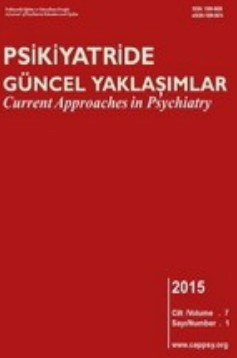Fibromiyalji ile İlişkili Psikolojik Faktörler ve Psikolojik Müdahale Alanları
Psychological Factors Associated with Fibromyalgia and the Areas of Psychological Intervention
Author(s): Rumeysa Eda Kanık Tezcan, Özden Yalçınkaya AlkarSubject(s): Cognitive Psychology, Psychology of Self, Health and medicine and law
Published by: Çukurova Universitesi Tip Fakultesi Psikiyatri Anabilim Dalı
Keywords: Chronic pain; fibromyalgia; multidisciplinary treatments; psychological intervention;
Summary/Abstract: Fibromyalgia is a musculoskeletal pain syndrome characterized with the presence of sensitive points and widespread chronic pain and restricts one’s daily life activities and decreases the quality of life. The etiology of fibromyalgia is unclear, but there are numerous hypotheses regarding the emergence and progression of the disease. Among these, the biopsychosocial model offers a holistic framework in which biological, psychological and social mechanisms play a role in the development of fibromyalgia. Since the etiology of the disease is not yet understood, effective methods for its treatment have not been found, thus, interventions aim to reduce the effect of fibromyalgia and increase psychological and physiological functionality. This article aims to examine the psychological intervention areas and methods for fibromyalgia patients. In the literature, it is concluded that pain avoidance beliefs and behaviors, self-efficacy, physical activity, sleep quality, self-compassion, emotional skills, coping strategies, personality, comorbid psychopathology are the factors related with the emergence of the disease, severity of pain, and adherence to treatment in fibromyalgia patients. In this context, Cognitive-Behavioral Therapy (CBT), physical exercises, sleep management Acceptance and Commitment Therapy (ACT), compassion focused psychotherapies, mindfulness based psychotherapies, emotion expression and emotion regulation techniques, and biofeedback are recommended as effective methods which can be included in the treatment plans of fibromyalgia patients. Moreover, considering the psychosocial factors in the assessment processes was essential to establish individualized treatment plans. In addition, the importance of multidisciplinary approaches in the treatment processes of fibromyalgia has been discussed within the framework of the biopsychosocial model.
Journal: Psikiyatride Güncel Yaklaşımlar
- Issue Year: 14/2022
- Issue No: 2
- Page Range: 221-234
- Page Count: 14
- Language: Turkish

